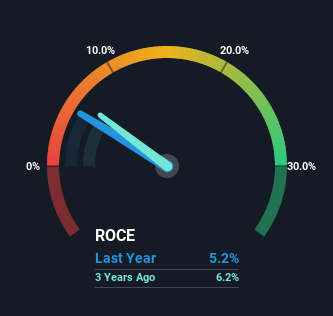- India
- /
- Renewable Energy
- /
- NSEI:GREENPOWER
Orient Green Power (NSE:GREENPOWER) Could Be Struggling To Allocate Capital
What underlying fundamental trends can indicate that a company might be in decline? A business that's potentially in decline often shows two trends, a return on capital employed (ROCE) that's declining, and a base of capital employed that's also declining. Basically the company is earning less on its investments and it is also reducing its total assets. On that note, looking into Orient Green Power (NSE:GREENPOWER), we weren't too upbeat about how things were going.
Understanding Return On Capital Employed (ROCE)
For those who don't know, ROCE is a measure of a company's yearly pre-tax profit (its return), relative to the capital employed in the business. Analysts use this formula to calculate it for Orient Green Power:
Return on Capital Employed = Earnings Before Interest and Tax (EBIT) ÷ (Total Assets - Current Liabilities)
0.052 = ₹826m ÷ (₹18b - ₹2.4b) (Based on the trailing twelve months to December 2022).
Therefore, Orient Green Power has an ROCE of 5.2%. Ultimately, that's a low return and it under-performs the Renewable Energy industry average of 8.6%.
Check out our latest analysis for Orient Green Power

Historical performance is a great place to start when researching a stock so above you can see the gauge for Orient Green Power's ROCE against it's prior returns. If you'd like to look at how Orient Green Power has performed in the past in other metrics, you can view this free graph of past earnings, revenue and cash flow.
What Can We Tell From Orient Green Power's ROCE Trend?
We are a bit worried about the trend of returns on capital at Orient Green Power. About five years ago, returns on capital were 7.5%, however they're now substantially lower than that as we saw above. And on the capital employed front, the business is utilizing roughly the same amount of capital as it was back then. This combination can be indicative of a mature business that still has areas to deploy capital, but the returns received aren't as high due potentially to new competition or smaller margins. If these trends continue, we wouldn't expect Orient Green Power to turn into a multi-bagger.
On a side note, Orient Green Power has done well to pay down its current liabilities to 13% of total assets. That could partly explain why the ROCE has dropped. Effectively this means their suppliers or short-term creditors are funding less of the business, which reduces some elements of risk. Some would claim this reduces the business' efficiency at generating ROCE since it is now funding more of the operations with its own money.
What We Can Learn From Orient Green Power's ROCE
In summary, it's unfortunate that Orient Green Power is generating lower returns from the same amount of capital. Long term shareholders who've owned the stock over the last five years have experienced a 13% depreciation in their investment, so it appears the market might not like these trends either. With underlying trends that aren't great in these areas, we'd consider looking elsewhere.
Orient Green Power does have some risks, we noticed 4 warning signs (and 1 which is a bit unpleasant) we think you should know about.
While Orient Green Power may not currently earn the highest returns, we've compiled a list of companies that currently earn more than 25% return on equity. Check out this free list here.
New: AI Stock Screener & Alerts
Our new AI Stock Screener scans the market every day to uncover opportunities.
• Dividend Powerhouses (3%+ Yield)
• Undervalued Small Caps with Insider Buying
• High growth Tech and AI Companies
Or build your own from over 50 metrics.
Have feedback on this article? Concerned about the content? Get in touch with us directly. Alternatively, email editorial-team (at) simplywallst.com.
This article by Simply Wall St is general in nature. We provide commentary based on historical data and analyst forecasts only using an unbiased methodology and our articles are not intended to be financial advice. It does not constitute a recommendation to buy or sell any stock, and does not take account of your objectives, or your financial situation. We aim to bring you long-term focused analysis driven by fundamental data. Note that our analysis may not factor in the latest price-sensitive company announcements or qualitative material. Simply Wall St has no position in any stocks mentioned.
About NSEI:GREENPOWER
Orient Green Power
An independent power producer of renewable power, engages in the generation and sale of wind energy in India and Croatia.
Proven track record with adequate balance sheet.
Similar Companies
Market Insights
Community Narratives



